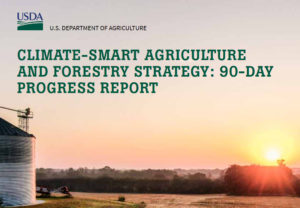 USDA’s 90-Day Progress Report on Climate-Smart Agriculture and Forestry which includes stakeholder input on how to best use programs, funding and financing capacities to encourage the voluntary adoption of climate-smart agricultural practices. The report also supports the role of agriculture in de-carbonizing the transportation sector.
USDA’s 90-Day Progress Report on Climate-Smart Agriculture and Forestry which includes stakeholder input on how to best use programs, funding and financing capacities to encourage the voluntary adoption of climate-smart agricultural practices. The report also supports the role of agriculture in de-carbonizing the transportation sector.
The growth of the U.S. biofuels sector, driven in part by the Renewable Fuels Standard, has reduced GHGs and strengthened the rural economy. Ethanol produced from corn reduces GHG emissions relative to gasoline. Market opportunities such as California’s Low Carbon Fuels Standard and the 45Q Federal Tax Credit for carbon capture and sequestration can further drive down the GHG footprint of the biofuels sector. USDA should identify opportunities for agriculture and forestry to play a role in the production of low-carbon biofuel feedstocks, and for innovative technologies such as Bioenergy with Carbon Capture (BECCS) to reduce emissions associated with biofuel production while spurring rural economic development.
During a call announcing a new Farm Journal Foundation report on how U.S. farmers can be part of the climate change solution, the director of the USDA’s Office of Energy and Environmental Policy commented on California’s LCFS. “Biofuel producers have a strong incentive to reduce the greenhouse gas intensity of the fuel’s they are producing, whether it be renewable diesel, biodiesel or ethanol,” said Bill Hohenstein.
Bill Hohenstein, USDA, comments on LCFS and biofuels (1:08)
The report is in response to President Biden’s Executive Order on Tackling the Climate Crisis at Home and Abroad which states, “America’s farmers, ranchers, and forest landowners have an important role to play in combating the climate crisis and reducing greenhouse gas emissions, by sequestering carbon in soils, grasses, trees, and other vegetation and sourcing sustainable bioproducts and fuels.”

